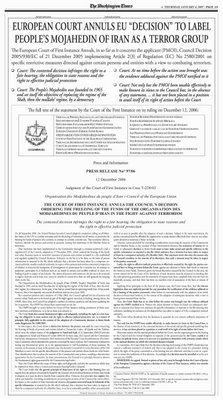Wednesday, 28 March 2007
NCRI – Pursuing their policy of appeasement, some European Union states have told the mullahs they will do their best to maintain the PMOI on the terror list, ignoring the fact that the European Court of Justice stated this to be illegal. They hope this measure will lead to Tehran stopping its nuclear activities. These revelations were made by an MEP and representatives of the Iranian Resistance at a press conference in Berlin on 23 March. The German capital welcomed the EU heads of state to celebrate the 50th anniversary of the creation of the European Community… Read More
